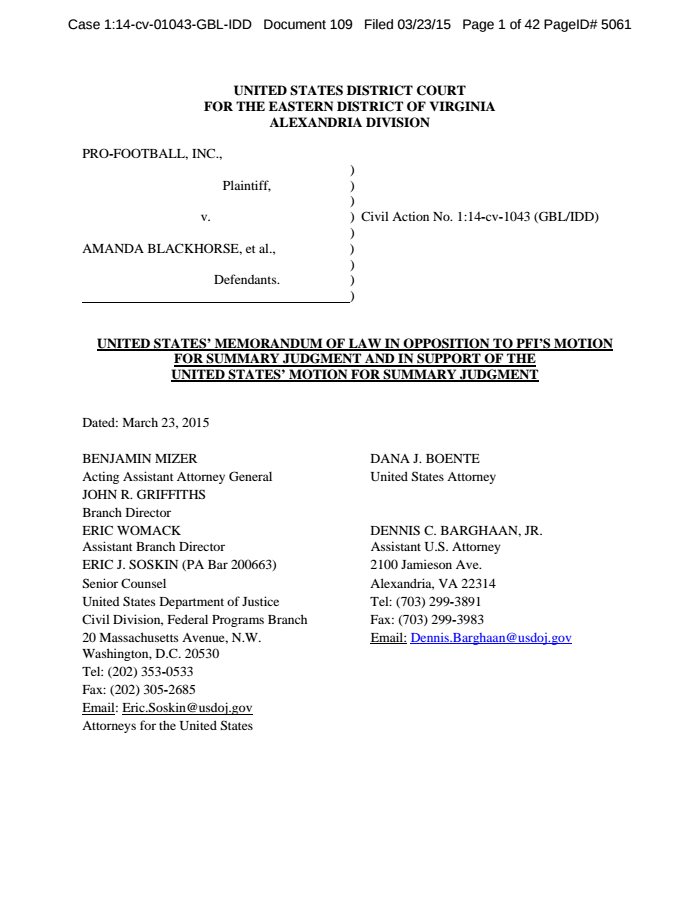
The Redskins still have the right to use the name, but according to a Department of Justice argument filed in a federal court on Monday, so does everyone else.
In 2014, the United States Patent and Trademark Office canceled the team's registered trademark, saying the name is "disparaging" to Native Americans. The team filed a lawsuit against the Native American activists who filed the original complaint, claiming a violation of their First Amendment rights.
The team retains their rights while the decision is under appeal, and the Department of Justice's filing is not a decision on the matter, but rather an endorsement of the patent office's move.
(Throughout the memo, the team is referred to as "Pro-Football, Inc.," or "PFI," which is the name the team uses for business purposes.)
The DOJ says that the Redskins are still allowed to use the name if they'd like, but that because the process of registering a trademark through the federal government uses public funds, they are not protected by trademark law.
In the Lanham Act, because operation of the federal trademark registration program entails the expenditure of public funds in evaluating and approving marks and the exercise of legal authority in conferring procedural advantages, Congress is under no obligation to subsidize "a more convenient method" of trademark enforcement for applicants. Here, PFI remains "free to engage in such speech as [it] see[s] fit," including using pre-existing state law remedies to enforce its trademark. PFI is "simply . . . barred from enlisting the [Patent & Trademark Office] in support" of its speech.
The Redskins (and the ACLU) have argued that the Lanham Act, which prohibits the government from registering trademarks for, among other things, language that disparages a group's racial identity, is a flimsy and inconsistently applied facet of trademark law. In the memo, the DOJ ardently defends the Lanham Act, and says the argument is unfairly taken out of context.
The effort by Pro-Football, Inc. ("PFI") to attack Section 2(a) of the Lanham Act in isolation ignores its context as part of the federal trademark registration scheme, structured to provide protections to trademark owners and the public without disrupting a parallel system of state law.
The team argues that saying their name "may disparage" Native Americans is too vague, but the DOJ lists a handful of examples of equally "vague" language that have been deemed suitable by the Supreme Court.
As the Trademark Trial and Appeal Board has explained, a disparaging trademark is one that may "dishonor by comparison with what is inferior, slight, deprecate, degrade, or affect or injure by unjust comparison." [...] This definition, based on dictionaries published at the time of passage of the Lanham Act, constitutes a "comprehensible normative standard" in which a "standard of conduct is specified.
The Redskins have been insistent that their team name is meant to "honor" Native Americans, but the DOJ argues that the intent matters less than the impact.
It is not the "alleged honorable intent and manner of use of the term" at issue, but the objective question of "whether a substantial composite" of Native Americans found "Redskins" to be "a disparaging term in the context of [PFI's] services." [...] PFI's tortured effort to claim as-applied "viewpoint" discrimination by alleging that cancellation of registration restricts "[w]hat PFI says in [] debate," PFI's brands is equally baseless: PFI may continue to say whatever it likes about its brands or Native Americans without any limit at all
In layman's terms, the DOJ is telling the team that it can retain the name and image, but without the guarantee of exclusive rights.
A hearing between the parties has been scheduled for June 24.
An earlier version of this post incorrectly attributed portions of a brief to the Department of Justice instead of defendant Amanda Blackhorse. Both filed separate briefs supporting the patent office decision on Monday.

